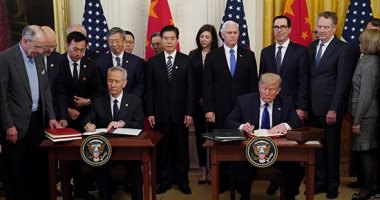LOC10:30
07:30 GMT
 The US President and Vice President of China sign at the White House the first part of the trade agreement
The US President and Vice President of China sign at the White House the first part of the trade agreement
By Shaimaa Al-Ruwaished
KUWAIT, Dec 29 (KUNA) -- The prevailing novel coronavirus (COVID-19), now mushrooming into diverse strains, left wide scale impact on nations' economies with the US incurring a record state deficit and the UK major economic recession.
Jan. 2: Greece, Cyprus and Israel inked an agreement for establishing a natural gas pipeline in the Mediterranean.
Jan. 10: The International Fund for Agricultural Development (IFAD) approved an agreement with Ethiopia to execute a development program worth USD 305 million for aiding more than 13 million farmers.
Jan. 15: US President Donald Trump and the Deputy Secretary-General of the Chinese State Council Liu He inked first chapter of a commercial deal at the White House.
Jan. 16: The US Senate endorsed by a majority a new commercial deal with Canada and Mexico to replace The North American Free Trade Agreement (NAFTA).
Jan. 29: US President Donald Trump signed a new commercial accord with Canada and Mexico replacing NAFTA that he considered as unfair for the US.
Feb. 4: Malaysian Prime Minister Mahathir bin Mohammad and his Pakistani counterpart Imran Khan declared an accord on establishing economic partnership between the two countries.
Feb. 16: US Trade Representative Robert Lighthizer declared the increase of fees by 5-15 percent on imported aircraft from the EU.
April 8: European aircraft-maker Airbus Industries scaled back aircraft production by around 33 percent because of the novel coronavirus.
April 15: The French government announced USD 120 billion assistance package to alleviate the loss of the companies that were affected from coronavirus.
April 23: President Donald Trump issued an executive order restricting certain categories of immigrants from entering the United States for 60 days as the country reels from COVID-19 pandemic.
April 23: European Union leaders approved 540 billion euro (USD 585 billion) package of safety nets to rescue the European economy as a result of COVID-19.
May 4: World leaders pledged 7.4 billion euros (USD eight billion) for European Commission's coronavirus vaccine fundraising conference that was held in Brussels.
May 4: The Iranian parliament approved to reform the country's currency rial by removing four zeros from the monetary unit.
May 16: US House of Representatives approved a USD three trillion bill crafted by Democrats to provide more aid for battling the coronavirus and stimulating a faltering economy that rocked by the pandemic.
May 27: The international labour organizations stated that more than one in six young people out of work due to COVID-19.
June 19: British public debt exceeded two trillion pounds sterling for the first time in the county's history since 1963.
June 30: The European Union announced pledging Fourth Conference on "Supporting the Future of Syria and the Region" with euro 6.9 billion (USD 7.7 billion).
Oct. 16: White House and Treasury data showed historical US deficit of USD 3.1 trillion.
Oct. 26: Turkish lira recorded historical decrease against US Dollar with eight liras equal USD one in currency exchange rate.
Nov. 6: Malaysian government issued the biggest budget in the country's history, USD 77.88 billion, to counter the effects of coronavirus on the economy.
Nov. 21: The UK and Canada reached an agreement to keep commercial ties as is post-Brexit.
Dec. 3: Spanish parliament endorsed the 2021 state budget, projecting high taxes, expenditure, higher investments in various sectors and support for medium and small companies.
Dec. 4: Turkey launched the first train cargo trip to China via two continents, two seas and five countries.
Dec. 10: France fined Google euro 100 (USD 120 million), Amazon euro 35 million (USD 42 million) for non-abidance by the digital tracking system Cookies.
Dec. 15: Britain and Mexico inked a free trade agreement due to go into effect after interim Brexit period.
Dec. 16: European Parliament approved long-term EU budget for 2021-27 at a total value of euro 1.074 trillion (USD 1.305 trillion).
Dec. 18: The NATO approved a civil budget of euro 258.9 million (USD 317.4 million) and a military budget valued at euro 61.1 billion (USD 97.1 billion) for 2021.
Dec. 18: US Secretary of Commerce Wilbur Ross declared 77 Chinese companies were blacklisted for US national security considerations. (end)
sr.eng